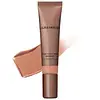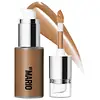What's inside
What's inside
 Key Ingredients
Key Ingredients

 Benefits
Benefits

 Concerns
Concerns

 Ingredients Side-by-side
Ingredients Side-by-side

Water
Skin ConditioningHydrogenated Polyisobutene
EmollientGlycerin
HumectantCaprylic/Capric Triglyceride
MaskingGlyceryl Oleate Citrate
EmulsifyingHexyl Laurate
EmollientSilica
AbrasiveHyaluronic Acid
HumectantCaffeine
Skin ConditioningPalmitoyl Tripeptide-1
Skin ConditioningPalmitoyl Tetrapeptide-7
Skin ConditioningTocopherol
AntioxidantHydroxyethyl Acrylate/Sodium Acryloyldimethyl Taurate Copolymer
Emulsion StabilisingPolyacrylate Crosspolymer-6
Emulsion StabilisingC18-36 Acid Glycol Ester
EmollientC18-36 Acid Triglyceride
EmollientC12-15 Alkyl Benzoate
AntimicrobialBoron Nitride
AbsorbentSorbitan Isostearate
EmulsifyingSorbitan Laurate
EmulsifyingSodium Benzoate
MaskingTriethoxycaprylylsilane
Tin Oxide
AbrasiveMica
Cosmetic ColorantEthylhexylglycerin
Skin ConditioningPhenoxyethanol
PreservativeCI 77891
Cosmetic ColorantIron Oxides
Water, Hydrogenated Polyisobutene, Glycerin, Caprylic/Capric Triglyceride, Glyceryl Oleate Citrate, Hexyl Laurate, Silica, Hyaluronic Acid, Caffeine, Palmitoyl Tripeptide-1, Palmitoyl Tetrapeptide-7, Tocopherol, Hydroxyethyl Acrylate/Sodium Acryloyldimethyl Taurate Copolymer, Polyacrylate Crosspolymer-6, C18-36 Acid Glycol Ester, C18-36 Acid Triglyceride, C12-15 Alkyl Benzoate, Boron Nitride, Sorbitan Isostearate, Sorbitan Laurate, Sodium Benzoate, Triethoxycaprylylsilane, Tin Oxide, Mica, Ethylhexylglycerin, Phenoxyethanol, CI 77891, Iron Oxides
 Reviews
Reviews

Alternatives
Ingredients Explained
These ingredients are found in both products.
Ingredients higher up in an ingredient list are typically present in a larger amount.
Ci 77891 is a white pigment from Titanium dioxide. It is naturally found in minerals such as rutile and ilmenite.
It's main function is to add a white color to cosmetics. It can also be mixed with other colors to create different shades.
Ci 77891 is commonly found in sunscreens due to its ability to block UV rays.
Learn more about CI 77891Mica is a naturally occurring mineral used to add shimmer and color in cosmetics. It can also help improve the texture of a product or give it an opaque, white/silver color.
Serecite is the name for very fine but ragged grains of mica.
This ingredient is often coated with metal oxides like titanium dioxide. Trace amounts of heavy metals may be found in mica, but these metals are not harmful in our personal products.
Mica has been used since prehistoric times throughout the world. Ancient Egyptian, Indian, Greek, Roman, Aztec, and Chinese civilizations have used mica.
Learn more about MicaPhenoxyethanol is a preservative that has germicide, antimicrobial, and aromatic properties. Studies show that phenoxyethanol can prevent microbial growth. By itself, it has a scent that is similar to that of a rose.
It's often used in formulations along with Caprylyl Glycol to preserve the shelf life of products.
Sodium Benzoate is a preservative. It's used in both cosmetic and food products to inhibit the growth of mold and bacteria. It is typically produced synthetically.
Both the US FDA and EU Health Committee have approved the use of sodium benzoate. In the US, levels of 0.1% (of the total product) are allowed.
Sodium benzoate works as a preservative by inhibiting the growth of bacteria inside of cells. It prevents the cell from fermenting a type of sugar using an enzyme called phosphofructokinase.
It is the salt of benzoic acid. Foods containing sodium benzoate include soda, salad dressings, condiments, fruit juices, wines, and snack foods.
Studies for using ascorbic acid and sodium benzoate in cosmetics are lacking, especially in skincare routines with multiple steps.
We always recommend speaking with a professional, such as a dermatologist, if you have any concerns.
Learn more about Sodium BenzoateTin Oxide is an inorganic oxide used to add opacity and volume to a product. In nature, it is already found in mineral form. The main ore of tin is an opaque and shiny mineral called casseterite.
Tin Oxide helps remove translucency in a product, or make it more opaque. Besides adding opacity, tin oxide is used for bulking to add volume.
This ingredient is a combination of red, black, and yellow iron oxide pigments. This combination of colors is usually found in foundation, because it results in a "skin" color.